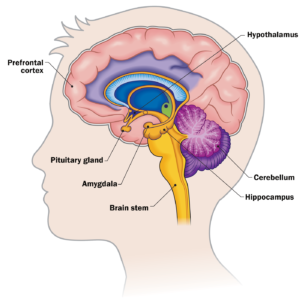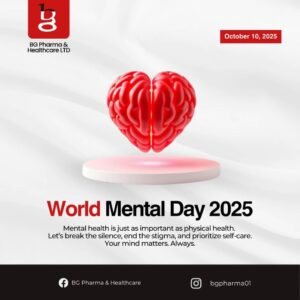Celebrating International Brain Day 2025: A Focus on Brain Health, Awareness, and Advancements in Neuroscience
On July 22, 2025, the global health community will unite to observe International Brain Day, a day dedicated to increasing awareness about the importance of brain health, highlighting advancements in neuroscience, and advocating for better care and research for neurological conditions. At BG Pharma and Healthcare Ltd, we believe that brain health is fundamental to overall well-being, and we are excited to contribute to this important initiative by shedding light on the brain’s complexities, the challenges of neurological diseases, and the strides being made in research and treatment.

Why International Brain Day Matters
The human brain is undoubtedly one of the most vital and intricate organs in the body. It controls every thought, movement, emotion, and action, making it essential to not only our survival but also our quality of life. Brain health is closely linked to physical, mental, and emotional well-being, and maintaining brain function throughout life is crucial for leading a fulfilling, productive life.
International Brain Day serves as a reminder of the profound impact that brain health has on individuals, families, and communities around the world. It’s an opportunity to raise awareness about brain-related disorders and to ensure that those affected by neurological conditions receive the care, support, and research attention they deserve.
The Importance of Brain Health
As we celebrate International Brain Day, it’s important to understand what makes brain health so essential and what can threaten it. Brain health is not just about avoiding neurological diseases, it’s also about fostering cognitive function, mental clarity, emotional stability, and overall mental well-being.
1. Physical Brain Health: Maintaining a healthy brain requires proper nutrition, exercise, and sufficient sleep. Cardiovascular health is also directly linked to brain function, as the brain relies on a steady supply of oxygenated blood to perform its tasks effectively.
2. Mental and Cognitive Health: Cognitive functions like memory, learning, problem-solving, and attention span are integral to brain health. Keeping the brain active and engaged through education, hobbies, and social interaction helps stimulate neural connections, potentially delaying age-related cognitive decline.
3. Emotional and Psychological Health: Mental health is intrinsically connected to brain health. Disorders like depression, anxiety, and other mood disorders have a direct impact on the brain’s functioning. By prioritizing emotional and psychological health, we ensure that our brain can respond more effectively to stressors and challenges.
Neurological Diseases: The Global Challenge
Neurological disorders are a major global health challenge, affecting millions of people worldwide. These conditions can have a profound impact on individuals and their families, often leading to long-term disability and reduced quality of life. Some of the most common and debilitating brain conditions include:
Alzheimer’s Disease and Dementia: Affecting millions of elderly individuals worldwide, these conditions cause progressive memory loss and cognitive decline, severely impairing a person’s ability to function independently.
Parkinson’s Disease: A progressive neurodegenerative disorder that affects movement, often causing tremors, rigidity, and bradykinesia (slowness of movement).
Stroke: A leading cause of disability, a stroke occurs when blood flow to a part of the brain is blocked or reduced, causing brain cells to die. Strokes can lead to permanent damage depending on the severity.
Multiple Sclerosis (MS): A chronic condition that affects the central nervous system by damaging the protective covering of nerve fibers, leading to problems with muscle control, balance, and vision.
Epilepsy: Characterized by recurrent seizures, epilepsy affects millions of people worldwide, disrupting normal brain activity and potentially leading to cognitive and physical disabilities.
Traumatic Brain Injury (TBI): Whether caused by an accident, fall, or assault, TBI can have long-lasting effects on cognition, emotions, and physical abilities.
Migraine and Other Neurological Pain Disorders: Conditions like chronic migraines or neuralgia can severely impact daily life and hinder one’s ability to work, study, or socialize.
These conditions not only affect the individual but also place a significant burden on families, healthcare systems, and economies. Raising awareness about neurological diseases is a critical first step in addressing this global health issue. It also helps promote early detection, intervention, and treatment options that can make a significant difference in patients’ lives.
Advancements in Brain Health Research
Over the past decade, remarkable progress has been made in the field of neuroscience, providing new insights into brain function, neuroplasticity, and treatments for neurological disorders. Here are some of the major advancements that are paving the way for improved brain health:
1. Neurogenesis and Brain Plasticity: It was once believed that the adult brain could not regenerate new neurons. However, recent research has revealed that neurogenesis (the formation of new neurons) occurs in specific brain regions, like the hippocampus, even in adults. This discovery offers hope for the treatment of diseases like Alzheimer’s and stroke.
2. Gene Therapy: Gene therapy has the potential to transform the treatment of neurological conditions by targeting the underlying genetic causes of diseases like Parkinson’s disease, Huntington’s disease, and muscular dystrophy. This approach aims to correct or replace defective genes within the brain, offering the possibility of disease modification or even cure.
3. Stem Cell Therapy: Stem cell research has shown promise in repairing damaged brain tissue and even restoring lost functions. While clinical trials are still in the early stages, stem cell therapies may hold the key to treating neurological disorders that currently have no cure.
4. Deep Brain Stimulation (DBS): DBS has been used to treat conditions like Parkinson’s disease, tremors, and even depression. By stimulating specific areas of the brain with electrical impulses, DBS can help regulate abnormal brain activity, providing relief from symptoms and improving patients’ quality of life.
5. Advances in Imaging Technology: Techniques like functional magnetic resonance imaging (fMRI) and positron emission tomography (PET) allow researchers to visualize brain activity in real time. These technologies help us understand how the brain works and how it responds to injury or disease.
6. Personalized Medicine: As neuroscience advances, there is growing interest in the development of personalized treatment plans tailored to an individual’s unique genetic and biological makeup. This approach promises more effective treatments with fewer side effects, particularly for neurological diseases.
The Role of BG Pharma and Healthcare Ltd in Brain Health
At BG Pharma and Healthcare Ltd, we are committed to advancing brain health through innovative pharmaceutical products and research. We recognize the growing need for effective treatments and preventive strategies for neurological conditions, and our mission is to contribute to the global fight against these diseases by supporting groundbreaking research and providing effective therapeutic options.
Through collaboration with leading research institutions, medical professionals, and patient advocacy groups, BG Pharma is at the forefront of developing new therapies for brain-related disorders. Our goal is to not only provide cutting-edge treatments but also to increase awareness about the importance of brain health, particularly in preventing and managing neurological diseases.
What You Can Do on International Brain Day
As we observe International Brain Day 2025, there are several actions you can take to contribute to raising awareness about brain health:
1. Stay Informed and Educate Others: Share facts, statistics, and personal stories about brain health and neurological diseases with your friends, family, and colleagues. Knowledge is key to removing the stigma surrounding brain conditions and promoting early diagnosis and intervention.
2. Support Brain Health Initiatives: Consider donating to brain health organizations that fund research into neurological diseases. Your support can help accelerate the development of new treatments and provide vital resources for patients and families affected by these conditions.
3. Take Care of Your Brain: Prioritize your brain health by adopting healthy habits such as regular exercise, a balanced diet rich in brain-boosting nutrients, adequate sleep, and mental stimulation. Engaging in activities that challenge your brain, such as learning a new skill or solving puzzles, can help maintain cognitive function over time.
4. Participate in Brain Health Events: Many organizations host events such as webinars, walks, and fundraising drives on International Brain Day. Participating in these activities is a powerful way to show solidarity and support for brain health research.
5. Advocate for Better Brain Health Policies: Advocate for increased funding for brain health research and improved access to care for individuals living with neurological conditions. Policy changes can help improve outcomes for patients and lead to greater investments in research and development.
Conclusion
International Brain Day 2025 is a critical moment to focus on the importance of brain health, raise awareness about neurological diseases, and celebrate the advancements in research that are changing the landscape of brain health. Together, we can make a difference by advocating for greater research funding, supporting those affected by neurological conditions, and adopting lifestyles that promote lifelong brain health.
At BG Pharma and Healthcare Ltd, we remain committed to improving brain health through innovative treatments and ongoing research, ensuring that people living with brain-related conditions have access to the best care and support. Together, let’s take a step forward in ensuring a healthier future for our brains and our communities.
Stay connected with BG Pharma and Healthcare Ltd. Follow us on our social media channels and visit our website for more information on brain health initiatives and how you can get involved.



